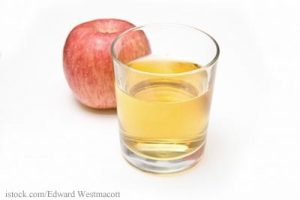Eighteen months after a Consumer Reports story on inorganic arsenic in apple juice triggered a wave of concern from consumers and demands for action from lawmakers, the U.S. Food and Drug Administration has proposed a limit on the acceptable level of inorganic arsenic, a carcinogen, in apple juice. The FDA has set an “action level” of 10 parts per billion (ppb), the same level set by the U.S. Environmental Protection Agency (EPA) for arsenic in drinking water.
 The threshold, which is based on lifetime exposure, is meant to provide guidance for the industry, and a trigger level for enforcement action.The limit is based on the FDA’s 2012 analysis of 94 samples of arsenic in apple juice that found 95 percent of samples contained less than10 ppb total arsenic and 100 percent of samples contained less than 10 ppb of inorganic arsenic. The proposed limit was based on that analysis and a peer-reviewed risk assessment of inorganic arsenic in apple juice conducted by FDA scientists. The assessment is based on lifetime exposure.
The threshold, which is based on lifetime exposure, is meant to provide guidance for the industry, and a trigger level for enforcement action.The limit is based on the FDA’s 2012 analysis of 94 samples of arsenic in apple juice that found 95 percent of samples contained less than10 ppb total arsenic and 100 percent of samples contained less than 10 ppb of inorganic arsenic. The proposed limit was based on that analysis and a peer-reviewed risk assessment of inorganic arsenic in apple juice conducted by FDA scientists. The assessment is based on lifetime exposure.
Organic arsenic is a naturally occurring element that can be found in the water, soil and air. Inorganic arsenic may be found in foods or the environment because of past use of arsenic-containing pesticides. It has been associated with cancer, skin lesions, developmental effects, cardiovascular disease, neurotoxicity, and diabetes.
“The FDA is committed to ensuring the safety of the American food supply and to doing what is necessary to protect public health,” said FDA Commissioner Margaret A. Hamburg, M.D., in a statement. “We have been studying this issue comprehensively, and based on the agency’s data and analytical work, the FDA is confident in the overall safety of apple juice for children and adults.”
Congresswoman Rosa DeLauro (D-CT), Senior Democrat on the House Appropriations Subcommittee on Labor, Health, Human Services, and Education, and Frank Pallone, Jr. (D-NJ), Senior Democrat on the House Energy and Commerce Health Subcommittee, have called for the agency to implement enforceable standards for the maximum allowable levels of arsenic in juice and rice as have consumer groups including Food and Water Watch. The FDA will be accepting comment on the proposed limit for 60 days.




